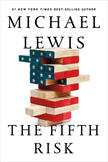Review: Is government the problem? Not really.
One of the most powerful ideas in modern U.S. politics is libertarian governmental nihilism. The bureaucrats, as President Ronald Reagan famously intoned, aren’t a solution; “Government is the problem.” That slogan inspired a generation of conservatives who called for slashing government bureaucracy. In The Fifth Risk, the nation’s nonfiction bard, Michael Lewis, makes the case that our government is more important—and competent—than we realize.
“How to stop a virus, how to take a census, how to determine if some foreign country is seeking to obtain a nuclear weapon or if North Korean missiles can reach Kansas City,” Lewis writes, describing the kind of unprofitable government scheme it would be dangerous to abandon or outsource.
The title of this short book comes from a government official’s lists of top risks faced by the Department of Energy. What is the “fifth risk” of the title? “Project management,” says the official, enigmatically.
Lewis reports that President Trump has channeled the small-government movement into an organization concerned with a few resonant issues, like climate change, advancing the interests of its supporters and personal loyalty. When the Obama administration tried to help Trump transition officials cope with their giant new job, the new bosses of two million federal employees showed little interest.
It is one thing if a private firm gets rich exploiting free services paid for by taxes. It’s another if the private firm itself gets to take over the service.
NASA is the rare government institution that is widely popular. The reason, says Lewis, is that NASA is allowed to market itself and that NASA has heroes. One is Kathy Sullivan, for example, the first woman to walk in space, in 1984. When Lewis finds her three decades later, she’s running the National Oceanic and Atmospheric Administration. NOAA, part of the Department of Commerce, oversees the National Weather Service, collecting and publishing (for free) comprehensive weather data that private companies like AccuWeather repackage and sell.
Trump’s nominee to run NOAA is not a NASA scientist, but Barry Myers, chief executive officer of AccuWeather. Myers, whose appointment is still awaiting Senate confirmation, has lobbied to make the N.W.S. data more opaque, which would increase the attractiveness of his company’s offerings.
As Lewis illustrates, it is one thing if a private firm gets rich exploiting free services paid for by taxes. It’s another if the private firm itself gets to take over the service. That is not what Reagan libertarians had in mind.
This article also appeared in print, under the headline “Is government the problem?,” in the April 29, 2019, issue.









